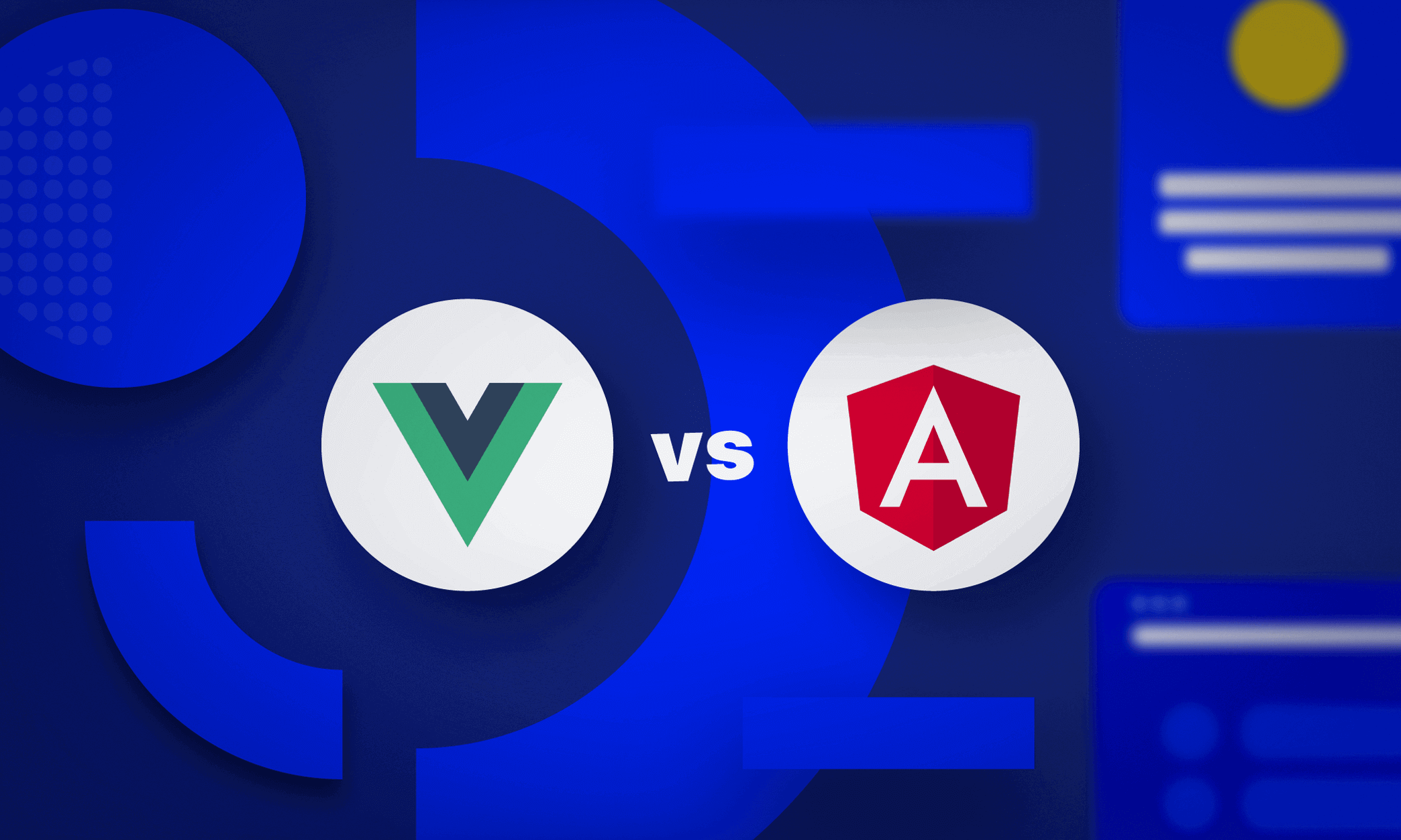Choosing a front-end framework for your web product can be a tricky task. Depending on the product you or your team are building, the priorities and required features will change significantly. When a framework corresponds to those needs and features, your platform will run smoothly. However, if it is picked up hastily, you may increase the risks of development or, in some cases, even compromise your security.
Today, one of the most popular programming languages is JavaScript. Previously we have compared a few JavaScript frameworks (for instance, React.js and Angular). Given the increasing demand in both Angular and Vue.js developers, we have decided to expand our article series with a comprehensive analysis of Vue and Angular.
Both Vue and Angular are JavaScript frameworks that are similar in the terms of syntax and help web developers build complex and resilient apps, web pages, and software. Both of them have their own pros and cons but are often used for very different purposes.
What is Angular?
Angular is an open-source web application framework based on TypeScript released by Google in 2010. Since then, it is maintained by a team of developers inside the company. Angular web development is often a corporate choice for building interactive applications due to its vast functionality and high performance.
What is Vue?
Vue, also known as Vue.js, is a progressive open-source front-end JavaScript framework created in 2014 by Evan You. This front-end framework is known for its clean script architecture and its elegant designs. Interestingly enough, the creator himself claims that Vue was inspired by Angular, largely used at his former workplace at Google:
“I figured, what if I could just extract the part that I really liked about Angular and build something really lightweight without all the extra concepts involved?”
Recently introduced Vue 3 has moved to TypeScript.
Angular vs Vue: A full comparison
Performance
Both frameworks are very fast, having their own slight drawbacks. Vue tends to perform better in memory allocation. Angular is generally bulkier than Vue. Unlike Vue, the code written with Angular needs to be rendered fully on the server side, and only then it gets downloaded and runs in the app or browser. As a result, Angular may sometimes be slightly slower at the startup. Although Vue is overall faster, Angular performs much better in DOM manipulation.
Verdict: Vue
Scalability
Angular provides scalability by design with its modular development structure. Vue, on the other hand, is a lightweight framework. Despite that, it still can provide scalability within an already built application. The only drawback is that scaling with Vue might require a bigger strategy, involving forking, breaking down repositories and using separate plugins.
Verdict: Angular
Features
Both Vue and Angular have MVC (Model-View-Controller) architectures, which allow them to be used for complex projects while maintaining a well-structured code. Two-way data binding is among the strong features for both of them too.
Angular framework is often referred to as monolithic by JavaScript developers, as it provides numerous built-in functions and templates. Dependency injection is one of its notable attributes, enabling easier coding, reuse of code, simpler testing. Angular developers often mention Command Line Interface (especially for browsing among the ready-made packs and functions) and Angular CDK as some of the more appreciated features as well.
Vue’s smaller framework can be extended with third-party packages, as a result reducing the size of applications and increasing their speed. Minimal syntax and pure JavaScript are its characteristics that make coding significantly easier for developers and engineers. Virtual DOM and Suspense in Vue make rendering simpler and faster too.
Verdict: Overall Angular, but in many cases depends on your personal preferences and project needs
Security
Both Vue and Angular do have in-built protections from certain vulnerabilities and malicious attacks. For Vue, those are escaping HTML content and attribute bindings. Angular does something similar to the process of sanitization. Additionally, it prevents cross-site scripting, cross-site request forgery (XSRF), and cross-site script inclusion (XSSI). However, it is important to highlight that the security of the code is often essential in the hands of its developer. Using best practices, such as updating a framework in time, using only trusted templates, plugins and APIs, sanitizing and complying with security documentation are the best ways to protect your product and its users.
Verdict: Angular
Popularity and talent pool
According to Stack Overflow 2020 Developer Survey, Angular is one of the most used front-end frameworks occupying third place (25.1%), while Vue.js is slightly lower on the seventh-place (17.3%) in popularity. This could be attributed partially to a relative recentness of Vue, Angular being the older, more established one in the front-end community. BuiltWith trends show us a number of websites and apps detected by their system, which are using these JavaScript frameworks. Here we can observe a different dynamic. Angular usage statistics showcase that about 240,000 websites are powered by it. In comparison, 1.9 million websites are Vue-powered.
Front-end frameworks popularity analysis, thorough research that looks into downloads, depending packages, Github, StackOveflow, Google, and Reddit mentions displays that overall both Angular and Vue go hand-in-hand, with slightly higher Angular popularity on the separate platforms.
Verdict: Angular
Community
Both of the front-end JavaScript frameworks have their own dedicated communities, their professional front-end developers, and individuals online who can help in figuring out harder questions, who write plugins, and provide ready solutions.
Verdict: draw
Learning curve
Vue is considered one of the easiest front-end technologies to learn. To start working with it, all you need is familiarity with HTML and knowledge of plain JavaScript. It overlaps in functionality with Angular and provides higher customization options for Vue developers, especially considering third-party packages. However, with the introduction of TypeScript within Vue.js 3, the learning process will likely become more complicated.
Angular’s learning curve is known to be very steep. Consider what you know from the previous parts of the article — a huge library, TypeScript, MVC. Before working with Angular, a web developer must get familiar not only with its functions and variables but many other associated concepts. Though, the dedication and meticulousness, in this case, pays off with an ability to create more powerful platforms.
Verdict: Vue
Speed of development
The inner structure of a framework and the surrounding community helps developers to understand its ecosystem and work within it. Developers’ understanding of a respective framework and their ability to utilize it professionally and seamlessly play a role in the ultimate speed of development.
It is important to note that Angular is maintained by a corporate set of professionals, while Vue has more of an open-source community and a dedicated team, meaning Angular has more extensive documentation and in-built solutions. Additionally, it is also older, providing a larger professional community. Light architecture, a rich number of plugins and third-party add-ons, and compatibility with other technology are among Vue’s strong sides.
Verdict: draw
Cost of development
A cost of development may vary vastly on such criteria as having own or outsourced team, developer hourly rate, task complexity. Numerous outsourced web developers, companies, and IT business consultants may help estimate the best prices, explain potential risks and drawbacks for a specific project.
Verdict: Costs are never universal and depend on the market, labor cost, industry, specific project, and its characteristics
Vue vs Angular: A cheat sheet
Vue vs Angular: Examples of Use
What is Vue good for?
Combined with our previous analysis, Vue.js is a JavaScript framework that is best for companies and projects which value simplicity and flexibility. It will be utilized best in:
- Dynamic applications
- UI and UX-centered projects
- Portfolios and image-heavy websites
- Single-page apps
Notable clients: Alibaba, Grammarly, 9GAG, WizzAir, Nintendo, BuzzFeed
What is Angular good for?
Angular is a more reasonable technology for applications that need extensive functionality, for larger teams and projects that want to scale easily. Previously, we have collected some examples of great web development done by using the Angular framework. The strengths of Angular will shine in:
- Cross-platform and hybrid web development
- Enterprise software
- Apps that require server-side rendering
Notable clients: Microsoft Office, Deutsche Bank, Upwork, Gmail, Forbes, Udacity
Summary
Choosing the right JavaScript framework can help you in enabling the best practices for your projects. If you are still unsure about what might work best for your specific industry or product, don’t hesitate to consult with us. We can provide you with technical consultancy and deliver development experts skilled in Angular, Vue, and other JavaScript technologies, matched with your product specifications, industry and company culture. Hire vue.js developers and professional Angular teams with us!









